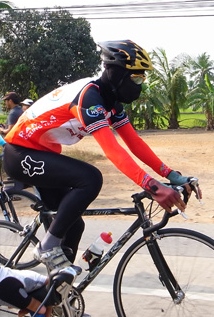 |
 ความคิดเห็นที่ 13
ความคิดเห็นที่ 13 |

คห 4 ผมว่าเข้าใจผิดมากๆ ไม่เคยอ่านงานวิจัยอะไรมาเลย ก็มาเผยแพร่ข้อมูลที่เป็นเท็จในเวปบอร์ดสาธารณะ
เอามาให้อ่าน
http://topicstock.pantip.com/lumpini/topicstock/2009/11/L8579916/L8579916.html
อาจารย์หมอมหิดล ไม่ใช่แค่หมอธรรมดานะครับ เป็น เป็นถึงอาจารย์ผู้เชี่ยวชาญเฉพาะทางที่สอนหมอตานะครับ
เฮ้อ ยุคเทคโนโลยี่อย่างนี้แล้ว มีคนเอาข้อมูลหลักฐานอ้างอิงทางวิทยาศาสตร์มีการทดลอง แล้วเขียนบทความทางวิชาการที่เป็นที่ยอมรับทั่วไป แต่คนในสวนลุมบางคน ยังสงสัยอีก
สงสัยเชื่อโฆษณามากกว่า อาจารย์ที่สอนจักษุแพทย์ ตามใจครับ เงินคุณเอง อย่างไรก็ใส่แว่นกันแดดออกจากบ้านเถิดครับ จะถูกหรือแพงก็ไม่ว่า เพราะมันก็ดีกว่าไม่ใส่อยู่แล้ว เพราะมันกันแสง UV ได้จริงๆ
แสง UV กระจอกมาก ไม่มีอำนาจทลุทลวงมากหรอก ถ้าไม่เชื่ออาจารย์หมอไทย ถ้าผมเอาบทความภาษาอังกฤษ เดี๋ยวก็ไม่เชื่ออีก เพราะอ่านเองไม่ออก เฮ้อ
ค้นมาให้
http://www.thaimtb.com/cgi-bin/viewkatoo.pl?id=14210
แว่นกันแดดราคาถูกก็ผ่าน US มาตรฐาน UV protection ว่าปลอดภัย
อ่านมานานพอควร คิดว่าคงมีประโยชน์บ้าง อาจารย์จักษุแพทย์มหิดลเปิดเผยว่าแว่นกันแดดที่ขายในเมืองไทยทั้งถูกและแพงถึงแม้ว่าจะไม่ป้องกันรังสี uv ได้ 100% แต่ผ่านมาตรฐานสหรัฐว่าปลอดภัยครับ ในบทความละเอียดกล่าวว่า ของแพงดีกว่าตรงที่วัสดุดีกว่าคงทนกว่า แต่อาจแพงกว่าเป็นสิบเท่า ด้วยเหตุนี้คนบางคนซื้อกรอบแว่นจีนแดงถูกๆ มาตัดเลนส์ หรือซื้อแว่นกันแดดถูกๆ ทันสมัย ปี สอง ปี ก็ทิ้งได้ไม่เสียดาย
From BANGKOK POST 09-12-2002
Problems with eye-wear
Low-cost eyeglasses come in a variety of styles, and sometimes the lens are coated with various colours to provide ``UV protection''. Is it possible that a 199-baht pair of sunglasses could protect our eyes from dangerous ultra violet rays?
Asst Prof Patthanee Samsen from the Department of Ophthalmology at Mahidol University conducted a test to check and see. She bought a wide collection of sunglasses boasting of UV protection, ranging from cheap to expensive, from street stalls to professional shops.
Interestingly enough, the ophthalmologist found that all samples, whether cheap or expensive, passed the American standard UV protection level, which is not 100-percent protection, but deemed safe.
In addition, Dr Patthanee pointed out that consumers sometimes have misconceptions about sunglasses. One concerns the colour of sunglasses. Some think that the darker the colour, the more UV protection they will provide. This was not true, she said. UV protection does not depend on the colour. In fact, the coloured film on a pair of sunglasses is only there to cut the amount of visible light, to reduce the glare of the sun.
Ultra violet rays are invisible and cannot be seen by the human eye. Transparent, non-coloured glasses can also provide UV protection, she said.
| จากคุณ |
:
K.Senior  
|
| เขียนเมื่อ |
:
24 ก.พ. 53 22:36:09
|
|
|
|
 |





